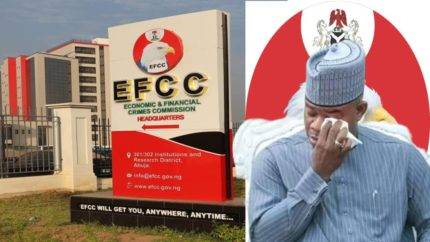In a significant development in the ongoing saga between the Economic and Financial Crimes Commission (EFCC) and former Kogi State Governor Yahaya Bello, the ex-governor has once again presented himself at the anti-graft agency’s headquarters. The move comes in the wake of the Supreme Court’s recent judgment dismissing states’ challenge to the EFCC’s constitutional authority.
Sources close to the investigation revealed that Bello arrived at the EFCC office on Tuesday, November 26, 2024, driving himself in a black Hilux vehicle, accompanied only by his legal team. This appearance marks a notable shift from previous encounters, particularly the dramatic September incident at the Kogi State Governor’s lodge in Asokoro, Federal Capital Territory, where EFCC officials’ attempts to arrest Bello resulted in an armed confrontation.
The former governor’s decision to honor the EFCC’s invitation follows months of complex legal battles and public confrontations. The anti-graft agency has been pursuing Bello over allegations of misappropriating public funds, with specific focus on alleged money laundering charges amounting to N80.2 billion. The stakes have recently heightened with the Federal Government’s move to file a 16-count charge against Bello before the Federal Capital Territory High Court in Abuja, expanding the scope to include allegations of criminal breach of trust involving N110.4 billion.
The timing of Bello’s appearance is particularly significant, coming just before a scheduled court hearing on November 27. At the previous hearing on November 14, the EFCC had requested an adjournment, citing an ongoing 30-day window for a previously issued summons. During that session, the Commission granted administrative bail to Bello’s co-defendants, Umar Oricha and Abdulsalami Hudu, while seeking additional time for the former governor’s appearance.
The case has been marked by contradicting narratives from both sides. Earlier statements from Bello’s camp, through his Media Office Director Ohiare Michael, had claimed the former governor had willingly presented himself to the EFCC “after due consultations with his family, legal team and political allies.” However, the EFCC, through its spokesman Dele Oyewale, promptly countered these assertions, maintaining that Bello remained wanted and was not in their custody at the time.
Today’s development represents a potentially crucial turning point in this high-profile case, which has captured national attention and raised important questions about accountability in public office. The investigation into Bello’s tenure as Kogi State governor has become emblematic of broader debates about financial transparency and the effectiveness of anti-corruption efforts in Nigeria’s political landscape.
The case’s progression has been closely watched by political observers and legal experts, particularly given its implications for state-federal relations and the scope of anti-corruption agencies’ powers. The Supreme Court’s recent ruling affirming the EFCC’s constitutional authority to investigate state finances has strengthened the Commission’s position in this and similar cases.
As the legal proceedings continue to unfold, the focus now shifts to how the EFCC will handle this latest development and what implications it might have for both the ongoing investigation and the broader fight against corruption in Nigeria. The case against Bello represents one of the most significant corruption investigations in recent years, with the potential to set important precedents for how similar cases are handled in the future.
The presence of Bello’s legal team during this visit suggests a carefully planned approach to engaging with the investigation, possibly indicating a new phase in the legal battle that has thus far been characterized by dramatic confrontations and public disagreements. As the case proceeds, it will likely continue to draw significant attention from both the media and the public, given its implications for accountability in public service and the effectiveness of Nigeria’s anti-corruption mechanisms.



